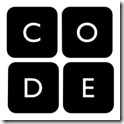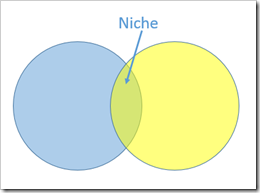Career Tip: The Power of a Niche
Editorial
Today as I often do when on the road I listened to a podcast during my morning routine before work. This is a great way for me to stay up-to-date on news and trends. My phone has a number of personal and professional podcasts queued for whenever I find an opportunity to listen. Much like TV channel surfing I’ll cruise through the podcasts looking for a topic of interest. In this morning’s podcast Scott Hanselman was interviewing Denise Jacobs on the topic Hacking The Creative Mind. Scott’s programs usually have an interesting angle.
It turns out that Denise Jacobs is an amazing woman who has done everything from making soap, to CSS web design, and now speaking about creativity. I was fascinated by the conversation, especially the part about recovering from perfectionism. That has been a long journey for me.
While listening it dawned on me how this wonderful woman has found her niche, that specialty the helps others and creates demand all at the same time. I’m always coaching peers on the value of finding your niche, and her story is a great example.
What is a “niche”?
I don’t know Ms. Jacobs other than what I heard on the podcast and read on her web site. However, it is quite clear that she is enjoying a niche. I describe it as an intersection of two specialties creating both personal fulfillment and professional demand. When done correctly you suddenly become attractive to both sides of the equation. Let’s break this down.
Ms. Jacobs is an expert in web development CSS (Cascading Style Sheets). She has written books and spoken at conferences on the subject. Among CSS specialists she is well-respected, but there are many other capable CSS specialists who can fill that same role. Now let’s jump tracks and think about brain science. There are many medical professionals specializing in this area as well, but no one of them is very popular among programmers. Suddenly in the middle of a podcast for programmers Ms. Jacobs starts talking about alpha waves in the brain and how they can help us identify periods of creativity. Her research in this area created a niche between programmers and brain science, then she labeled herself as a “creativity evangelist”.
Her formal training and specialty is in web design and computer programming. Like many other professionals programmers often are stumped by the creative process and want help in that area. Ms. Jacobs found her own answers to the problem, created a packaged solution targeting her programming peers, and now she is travelling all over Europe delivering seminars on the topic. She borrowed from another discipline to solve a problem in her own discipline.
History is full of people who have done this. Another recent example is Michael Hyatt. He was the CEO of a major publishing company around the time of the social media boom. Mr. Hyatt leveraged his knowledge of the publishing industry, authoring, and speaking. He took a risk and dove in head first with social media. No other publishing companies at the time had a CEO who was blogging and tweeting. It actually became quite controversial for his company. Fast forward to today and now Mr. Hyatt has his own niche speaking and writing on the topic of creating a social media platform. He primarily targets authors who want to get published. His niche intersects authors and social media. I highly recommend his book Platform: Get Noticed in a Noisy World.
I have created a niche in my career at Microsoft. Four years ago I was hired as a Microsoft Premier Field Engineer specializing in Active Directory. I knew AD pretty well, but so did several hundred of my peers. This was the single most popular specialty in my role! How could I distinguish myself in a competitive company? My other passion was scripting, and PowerShell was starting to gain traction. There are many MVPs and peers who do PowerShell. To either group (AD vs. PowerShell) I am just another guy. But when you put the two together suddenly there is demand. My blog jumped near the top of TechNet blog traffic, opportunities started coming to me, and now I speak on this niche topic at conferences. There are people that know AD better than me. There are people that know PowerShell better than me. But there are relatively few folks specializing in the AD PowerShell niche. I created my own sweet spot, the intersection of two specialties.
How do I get one?
These examples have some common traits, and I think we can infer a process for helping you find your own niche. I’m sure there are plenty of books on this topic, but I’ve not read any of them. These are my own observations:
Bridging
Each example involves two disciplines, professions, interests, passions, etc. Bridging the two suddenly differentiates you among the competition on either side of the niche equation. What are your hobbies, passions, and interests? Where do they intersect your profession? How can you mix the two for a unique specialty?
Timing
Michael Hyatt timed his niche with the social media explosion. I timed mine with PowerShell. Timing offers you an advantage of being on the cutting edge. You can establish a lead position ahead of your peers in a new specialty. The objective is not to climb over your peers, but a niche gives you unique visibility as a problem solver.
Need
Ms. Jacobs found a common frustration among programmers who needed help with creativity. Mr. Hyatt noticed the trend that authors without a social media platform were losing book proposals. I automated practical needs that Active Directory administrators struggle with on a daily basis. Each of these scenarios met a felt need among peers. This in turn spawned demand for unique services.
Credibility
A niche begins with strong competence in at least one area and a less-specialized interest in a second area. That primary competence establishes your credibility and creates a “safety zone” for you to explore your secondary interest. Then you can leverage your reputation to launch your niche by combining the two areas.
Relevance
I once heard Seth Godin say that if you make your niche small enough you can be the “best in the world” at anything. By definition that is the power of a niche. However if you decide to be the best in the world at toenail polish for koala bears, then you’re doing it wrong. That would be a specialized niche for sure, but someone has to really want what you can deliver.
Advice
Having trouble coming up with niche ideas? Ask your mentor and coworkers what your strengths are. Seeking feedback from others is a core tool in your career bag. Sometimes they can see our unique abilities when we don’t think we have anything special to offer. You do have a mentor, right?
Who cares?
I can see the power of a niche being relevant to many types of people. Do you fall into one of the categories below?
IT Professionals
Go learn PowerShell Desired State Configuration. This is a new technology that will be more disruptive than the PowerShell language itself. Then specialize in it for your favorite technology. Suddenly you are the best in the world in your niche. You will have huge demand for your skills in two years when this takes off on the adoption curve. Start learning PowerShell DSC now.
Students
Looking for career options? If you are studying computer science, then pick some fun classes outside your major. If you are not studying computer science, then take a couple programming classes. In both cases this will give your career an edge within your specific field. Here is a recent article telling young journalists to learn to code now.
 Career-Changers
Career-Changers
Learn to code. Seriously. Code.org explains that there is an immense shortage of people to fill programming jobs. Leverage your professional experience to branch out into an area that could prove to be even more lucrative in your future. You have probably noticed that I am slightly biased towards coding. You can get a job in any industry in any town as a programmer. It is an instant niche-maker.
Career-Stalled
Have you reached a plateau in your career? Need a new challenge? Trapped at one company? Then build your own niche. Differentiate yourself. Take on a new interest. Dan Miller says that if you read three books on any given topic you can become and expert in demand for your services. Leverage audio books and podcasts on your commute to learn something new. Start blogging and tweeting. Build your own brand to float your career to the next level.
Over-Achievers
I know you cannot sit still. It’s hard to focus. There are so many interesting ideas to pursue. Innovation happens every day. What am I missing right now? Go buy a 3D printer and disrupt your market. You’ve got it in you. Make your own luck… make a new niche.
Ego-Maniacs
Um. Sorry. This may not be for you. Niches are very tiny spaces. There are a couple people online that know who I am, but that’s it. Try talking about “Active Directory PowerShell” at a family reunion. Yip. Nothing but blank stares. I’m just a regular guy to the rest of the world. I do it, because I can make a difference for a few.
Go!
If you’ve read this article all the way to the end, then congratulations. That means you are ready for a new challenge. Go make a niche and change the world.
